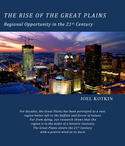Addis Abeba is the capital of Ethiopia and calls itself the "diplomatic capital" of Africa, by virtue of the fact that the African Union is located here. Yet Ethiopia is still one of the most rural nations in both Africa and the world. Ethiopia also appears to be among the most tolerant. Various forms of Christianity claim account for approximately 65 percent of the population, with the Ethiopian Orthodox Church (Coptic) holding the dominant share. At the same time there is a sizable Muslim minority, at more than 30 percent of the population. read more »
Despite the Great Recession, Obama’s New Coalition of Elites Has Thrived
The middle class, we’re frequently told, decides elections. But the 2012 race has in many ways been a contest between two elites, with the plutocratic corporate class lining up behind Mitt Romney to try and reclaim its position on top of the pile from an ascendant new group—made up of the leaders of social and traditional media, the upper bureaucracy and the academy—that’s bet big on Barack Obama. read more »
Cities Flying Too Close to the Sun
I was honored to speak at a conference in Milwaukee over the summer called Milwaukee’s Future in the Chicago Mega-City. Chicago and Milwaukee are about 90 miles apart on I-94. There’s an Amtrak link that makes the journey in about 90 minutes. The two cities have been sprawling such that there’s now more or less continuous development along the lakefront between the two cities. Milwaukee has been a challenged city economically and demographically. read more »
Superstorm Sandy & The Beachfront Bailout
Deadline reporters, especially in weather broadcasts from the surf line, have been wailing about “this enormous storm” or “the unfolding tragedy.” What they might also say is that hurricanes are a munificent windfall for newspapers, television stations, the federal government, construction unions, and politicians seeking reelection. In addition to classifying storms from one to five on the Saffir-Simpson scale, going forward it might also be possible to grade hurricanes as profit centers, or by the surge levels that they generate in reelection campaigns. read more »
Obama’s Base and Politics of Disappointment
There may be no better illustration of President Barack Obama’s appeal than his ability to hold onto voters — minorities, single moms and young people — who have fared the worst under his presidency. But the bigger question as we approach Election Day may be whether these constituencies, having been mauled by the economy, show up in sufficient numbers to save the presidential bacon.
Welcome to the politics of disappointment. Much has been said about the problems facing the middle class, who have been losing out since the 1970s. But the biggest recent losers have been groups like African-Americans. In the current economic downturn, middle class African-Americans have lost virtually all the gains they made over the past 30 years, according to the National Urban League. Median annual household income for blacks decline by more than 11 percent between June 2009 and June 2012, according to the Census bureau, twice the loss suffered by whites. read more »
The GOP’s Hispanic Political Malpractice
One of the more curious developments in American politics over the last two decades is the political malpractice of Republicans in dealing with Hispanic-Americans. Indeed, it now appears that the 2012 election may well be determined by the share of the Latino vote that Governor Mitt Romney is able to keep from falling into President Barack Obama’s column. read more »
Deep in the Heart of Texas: Private Donors Build a Medical Complex the Size of a Small City
When Americans think of oil executives, they tend to conjure up the image of J. R. Ewing: slick smile, sharp suits, cowboy boots, and a 10-gallon hat packed with bluster, vanity, and greed. According to Gallup, no industry is more widely reviled than oil and gas—not even banking, real estate, or heath care. The poll found that 64 percent of Americans disapprove of its activities. Only the federal government fared worse. read more »
Postwar Prefabs: Britain's Factory-Made Palaces
After the financial crisis of 2008, much of Great Britain's construction industry capacity was wiped out. Now, in 2012, there is much fear that the “traditional” construction industry is too weak to rapidly increase the rate of housing production, even if the administrative planning system wanted it to. Which it doesn’t. read more »
Local Government in Ohio: More Accessible and More Efficient
There is general agreement that smaller units of government are more responsive and accountable to their electorates. However, proponents of larger governments often claim that this advantage also creates higher spending and tax levels. On this basis, bigger-is-better proponents often suggest consolidating local governments to save money. Such calls have increased in recent years, with the unprecedented fiscal difficulties faced by governments from the federal to local level. read more »
The Rise of the Great Plains: Regional Opportunity in the 21st Century
This is the introduction to a new report on the future of the American Great Plains released today by Texas Tech University (TTU). The report was authored by Joel Kotkin; Delore Zimmerman, Mark Schill, and Matthew Leiphon of Praxis Strategy Group; and Kevin Mulligan of TTU. Visit TTU's page to download the full report, read the online version, or to check out the interactive online atlas of the region containing economic, demographic, and geographic data.
For much of the past century, the vast expanse known as the Great Plains has been largely written off as a bit player on the American stage. As the nation has urbanized, and turned increasingly into a service and technology-based economy, the semi-arid area between the Mississippi Valley and the Rockies has been described as little more than a mistaken misadventure best left undone. read more »






















